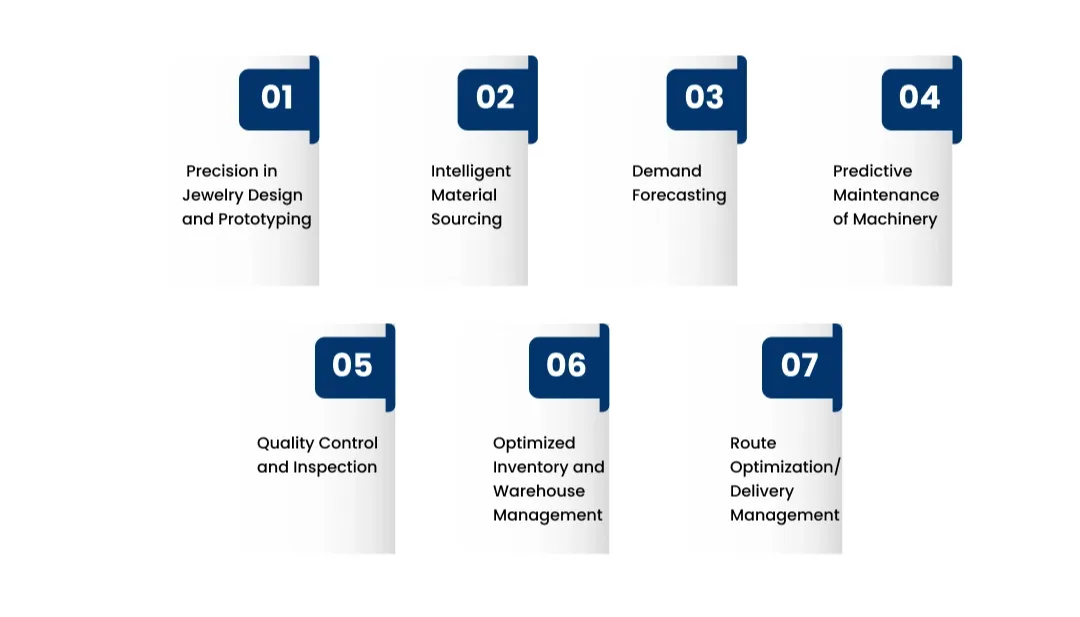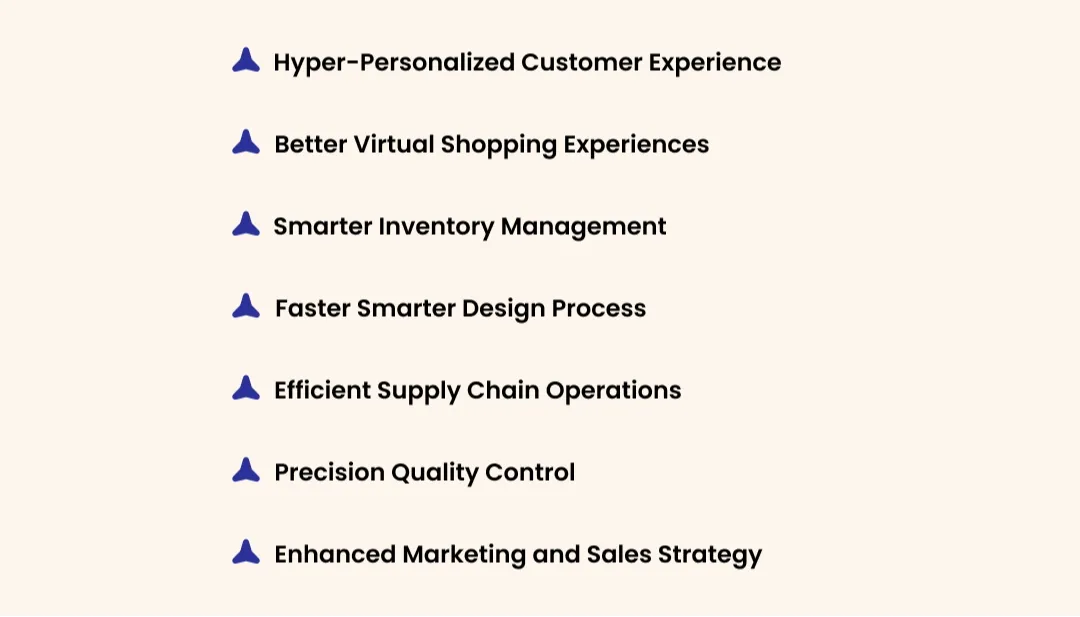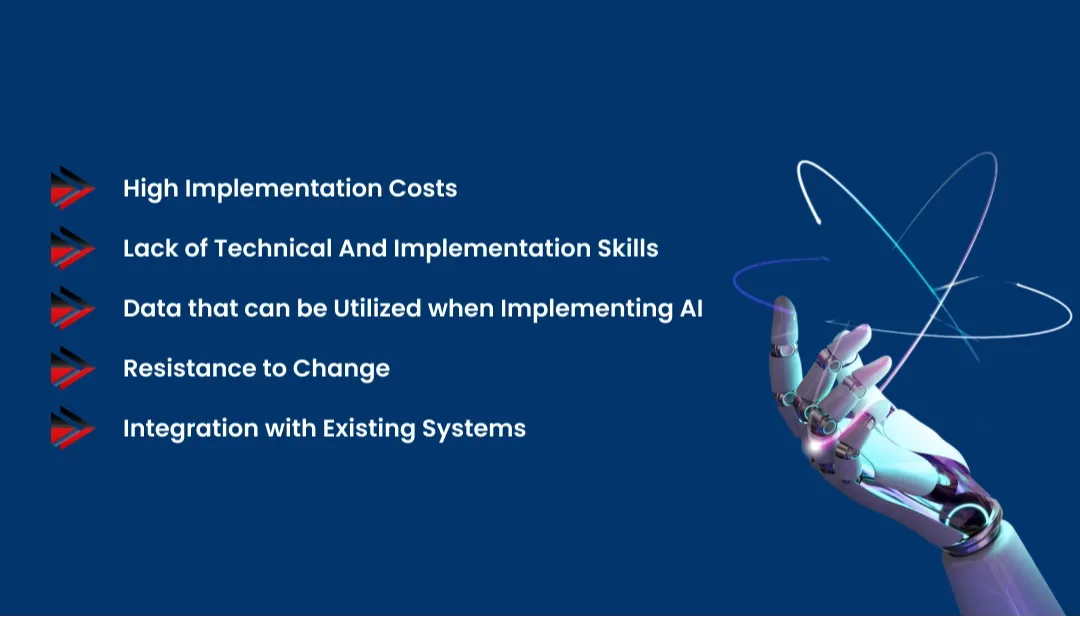AI In Jewelry: Transforming Online Shopping Experiences For Luxury Brands
Lokesh Saini
Jun 24, 2025

AI is disrupting the luxury jewelry market with immersive, data-driven, and personalized shopping experiences. With so much digital transformation underway, the global luxury e-commerce market is projected to reach $91 billion by 2026, with AI at the epicenter of this transformation and the unique demands it places on brands. Retailers can use AI to fulfill their objectives of customer satisfaction, brand loyalty, conversions, and sales omnichannel, from virtual try-ons and smart filters to chat bots and predictive analysis.
According to Deloitte, 80% of retail executives are planning to invest in AI to boost personalization, improve customer engagement, and impact experience. For Jewelry brands that need "eye-candy" when it comes to visual quality and luxury eCommerce Development exclusivity, AI delivers as a platform to leverage and connect the offline beauty experience with the online convenience.
This blog will help to answer how AI has fundamentally changed the jewelry eCommerce landscape for luxury brands and customers alike by allowing them to create more personalized transitions from engaging, seamless, and FRAMED memories in other words the only memory they can take away with them is the positive experience they have had by purchasing from your brand or forever they have a frame around their new jewelry piece, and the pieces that will come, creating a memory for every purchase.
Applications of AI in the Jewelry Industry
Artificial Intelligence (AI) is transforming the jewelry industry by helping companies achieve better efficiencies and functionality, improve customer experience, and make smarter decisions. Brands are unlocking new levels of personalized and precision performance because they can leverage AI in merchandising functions. Here are 10 of the most impactful applications of AI in this glittering arena:
1. Virtual Try-Ons
With AI-powered Argued Reality (AR) capabilities, it enables customers to Jewelry virtual try on AIrings, necklaces, or earrings on their mobiles or webcams. Online jewelry shopping with AI and augmented reality AR VR App not only replicates the physical in-store experience but also helps alleviate online buyer hesitancy, increase online conversion rates, and reduce product returns.
2. Personalised Recommendations
AI in e-commerce personalization employs machine learning algorithms that analyze a customer's online browsing history, purchase behaviors, and preferences. Smart jewelry shopping technology provides personalized recommendations, allowing customers to be even more satisfied with past purchases and enticing them to return and repurchase again, whether online or in-store.
3. Design Automation
AI tools and dashboards assist jewelry designers and visual merchandisers in coming up with unique jewelry designs and concepts based on current trends, customer preferences, and gemstone availability. AI systems enable straightforward students or new designers to quickly and easily advance their design to better hone their skills. The clouds even provide AI-guided design, allow for expedited time-to-market, and help to mesh design with creativity to even further possibilities through data-driven creativity. By integrating these capabilities, designers can take full advantage of the best AI productivity tools to streamline their workflow and enhance overall efficiency.
4. Inventory Management
Through sales and market behaviors, AI can optimize your Inventory Management Software more than traditional stock control systems. AI-powered jewelry shopping detects patterns in demand, manages stock levels in real-time, and highlights slow-moving or dead stock. This results in waste reduction eliminates under or overstocking, and improves the supply chain efficiency.
5. Pricing Optimization
AI in jewellery algorithms analyse demand, supply, competitor pricing and pricing strategies, and more of the overall shopping experience, enabling retailers to enhance their pricing by taking into consideration what competition is providing for similar products. This creates competitive pricing and increases margins.
6. Quality Control and Grading
Using image recognition and AI-based pattern analysis, jewelers can now utilize technology beyond traditional tools to grade diamonds and other gemstones and to assess cut, clarity, color, etc. The technology can better quantify grades while providing consistent grading and reducing human error.
7. Counterfeit Detection
AI improves the authentication process by helping jewelry manufacturers examine microscopic design patterns, materials, and markings that would be incredibly tough to replicate. By using AI in jewelry, counterfeit jewelry can be more easily identified, which helps preserve the authenticity of a person's jewelry, as well as the reputations of
brands and consumer trust.
8. Chatbots and Virtual Assistants
AI chatbots provide 24-hours assistance and can answer customer questions, provide customers with order tracking information, and offer personalized product suggestions. Chatbots enhance customer service like CRM Software allows businesses to operate more efficiently with fewer human resources.
9. Trend Forecasting
AI in jewellery allows jewelry brands to analyze real-time data from social media sources, as well as, tracking search trends and fashion reports, which allows brands to better forecast future jewelry styles and their collections.
10. Improved Understanding of Customers
AI in jewellery can enable businesses with analytics tools and create a better understanding of customer demographics, preferences, and buying patterns. AI personalization for jewelry websites enables brands to create personalized marketing campaigns, Digital Marketing and special loyalty marketing and improve overall user experience.
AI in Jewelry Manufacturing and Supply Chain

AI in jewelry industryis changing the jewelry manufacturing industry as well as supply chain processes for companies. By taking advantage of some of the capabilities AI has to offer, jewelry producers and manufacturers are enhancing production processes, supply chain delivery processes like Logistics Software Development product quality, improving logistics operations, minimizing costs, supply chain unit errors, and reducing rework of defects.
1. Precision in Jewelry Design and Prototyping
AI in jewellery, and particularly those that employ generative design, can create detailed jewelry designs based on customer preferences and market trends. These AI systems will sometimes explore hundreds of design possibilities, making suggested changes based on parameters like metal type, stone shape, and weight. In addition, when these systems are combined with 3D printing, the prototyping process is sped up and reduces the design to production process dramatically.
2. Intelligent Material Sourcing
AI-powered analytics platforms monitor the availability and price of gemstones and metal, while schools also monitor supplier performance to determine reliable sourcing partners. This informs the manufacturers that will help suppliers provide good sourcing costs and sourcing ethically, especially when tracking origins to ensure compliance or branding transparency to customers.
3. Demand Forecasting
AI in jewellery considers past sales, seasonality and other macro factors influencing demand to accurately identify product demand. By identifying demand and thus exhibiting forecast accuracy, jewelers will have a clearer view of forecasting lead times and build or not build products based on incorrect demand, avoiding sitting on excess product and/or also avoiding major stocks, two major problems in the industry.
4. Predictive Maintenance of Machinery
AI in jewellery sensors can monitor the machinery of a manufacturing facility in real-time and predict upcoming failures or when repairs are required. Early identification of these issues can aid in reducing anticipated downtime and can, based on scheduled repair times, build more seamless production cycles.
5. Quality Control and Inspection
Machine learning and computer vision systems are able to inspect finished jewelry for imperfections, flaws, or defects. Automated AI inspections are faster and more consistently reduce human error inspection. AI systems ensure greater standards in quality control.
6. Optimized Inventory and Warehouse Management
AI product recommendations for luxury brands simplify inventory management through stock level tracking, restock needs prediction and warehouse logistics. Smart systems may even automate reorder points and prioritize storage based on sales data.
7. Route Optimization/Delivery Management
In the supply chain, AI product recommendations for luxury brands algorithms work together to optimize raw material and finished product delivery routes. These algorithms are tasked with reducing shipment times and transportation costs and improving customer satisfaction.
Related Post - How Much Does It Cost To Build A Jewellery Website Like Tiffany?
The Benefits of Using AI in Jewelry Business

Artificial Intelligence (AI) is a game-changer for the jewelry industry, creating new possibilities and improving efficiency, customer experience, and profitability. Here are seven (7) important benefits of using AI in the jewelry business:
1. Hyper-Personalized Customer Experience
AI in jewelry industry enables hyper-personalization - meaning you can hyper-personalize your business by using your customers' data - including browsing history, preferences and purchase history - to prepare personalized suggestions for jewelry designs, product recommendations, and marketing content based on their preferences. The possibilities to engage consumers in their personal experience are limited only by your creativity! By hyper-personalizing your customer experience and offerings, you don't just improve engagement - you significantly increase engagement, and your sales, conversions, and profitability will grow.
2. Better Virtual Shopping Experiences
Augmented reality (AR) can allow customers to shop virtually. Customers can 'try-on' a jewellery piece (worn like clothing) from the comfort of their own home. AR will raise their confidence in making their purchasing decision online, based on their degree of accuracy and will also have a simultaneous large reduction in customer returns. This is an exciting, immersive shopping experience UI/UX Design for customers and significantly more fun and engaging than the customer experience of in-store shopping.
3. Smarter Inventory Management
AI in the jewellery industry allows retailers to manage their inventory more efficiently by predicting demand and assessing inventory in real time as well as automating the re-ordering process with very little waste and the ability to always stay on top of inventory levels avoiding excessive overstock or stock shortages that can both be just as damaging to a business and operationally inefficient.
4. Faster Smarter Design Process
AI in jewellery from Trendalytics and other sources can provide designers with infinite possibilities for creating beautiful final products, while AI can also effectively advise on trends, sourcing materials, and design patterns of trending products based on the demand. These Jewellery Ecommerce Development are invaluable assets that support the speed of ideation and prototyping, while continually aligning designs to the greater consumer need and current fashion trends.
5. Efficient Supply Chain Operations
AI is enhancing supply chain management in the jewelry industry as well. AI is tracking logistics, predicting when delays might occur, and enhancing delivery logistics through route-deduction and other methods of optimization. In terms of sourcing fair and competitively, AI is providing management with the ability to document and analyze supplier performance and Industrial ERP Software availability of specific materials costs, and ultimately keeping the rate of flow of production consistent.
6. Precision Quality Control
Through computer vision and machine-learning - Machine learning in retail jewelry will be able to examine jewelry at a higher degree than the eye can see, detecting any variances or imperfections of finish or alignment. This enhanced precision will make sure that manufacturers ensure a consistent/envelope finish without incurring customer complaints for items within the manufacturer's accountability, or also defect by third parties.
7. Enhanced Marketing and Sales Strategy
By assessing market trends, customer experience and competitor advertisements, AI in jewelry sector will enable to formulate brand valuable advertisements . AI will also predict which company has the best potential for collaborating, developing strategic alliances and opportunities to promote, establishing pricing strategies that are based on market-based analysis, which will result in conversion increases.
Also Read - A Complete Guide To ECommerce App Development 2026
Challenges in Adopting AI in the Jewelry Industry

Despite the numerous advantages that Artificial Intelligence (AI) can provide to the jewelry industry, many traditional businesses face hurdles that act as a barrier to the smooth introduction of AI. Outlined below are five significant challenges to implementing AI in the jewelry industry:
1. High Implementation Costs
Whether the AI is intended for automated design, assisted inventory processing, or customer engagement, introducing an AI system requires an investment in software, hardware, and skilled team members. Both small and medium-sized jewellers often struggle to find the available budget to invest in these technologies, making adoption challenging from a financial standpoint.
2. Lack of Technical And Implementation Skills
AI in jewellery integration requires knowledge of data science, machine learning, and digital tools. Many traditional Ecommerce Website Development do not have the technical resources, in-house or outsourced, to learn and implement AI technologies, creating a steep learning curve, and reliance on external consultants or service providers.
3. Data that can be Utilized when Implementing AI
Data is essential for AI to learn, but in many cases jewelry companies simply don’t have any structured customer information, or operational data. For AI systems to achieve bigger successes, the data used must not have limitations, be of acceptable quality, and be consistent. If there are limitations in the data it simply means ai won’t be able to develop reasonable insights or predictions.
4. Resistance to Change
Many jewellers rely on older systems that consist of manual processes. Employees and management are usually reluctant to accept AI because they feel as though they could lose their job, that the process of using ai could be daunting, or that it would disrupt the normal day to day conduct of the business.
5. Integration with Existing Systems
Effectively integrate AI in jewellery into pre-existing POS systems, inventory software, or e-commerce systems can be a heavy technical chore. There are difficulties regarding integration, which can cause inefficiencies, loss of data, or failures of the processes if integration is not done properly.
Final Thoughts
AI has fundamentally changed the interactions luxury jewelry brands have with customers in a digital world. AI, through virtual try-ons, personalized recommendations, intelligent chatbots, and dynamic pricing are advancing the customer journey, elevating the consumers' experience at each point in the digital shopping journey. Not only does AI offer a higher level of customer experience, but it can also change the way that businesses operate, generate sales, and give customers a reason to be loyal to their brands. As new technology evolves in the luxury jewelry space, luxury jewelry professionals will have the freedom to offer convenience, invention, and exclusivity by leveraging artificial intelligence to enhance the shopping experience. Shopping for jewelry online in the future will allow more personalization, smarter interactions, and more immersive shopping environments, all through harnessing the power of artificial intelligence. If you are interested in investing in the luxury jewelry space in 2026, connect with a top-level AI Development Company.
-
 How to Develop a Trading Platform Like Robinhood? A Complete Guide
How to Develop a Trading Platform Like Robinhood? A Complete Guide
-
 The Role of AI in Credit, Banking, and Investment Services: Trends Shaping the Future
The Role of AI in Credit, Banking, and Investment Services: Trends Shaping the Future
-
 Hire Gold Investment App Developers: Cost, Skills & Benefits
Hire Gold Investment App Developers: Cost, Skills & Benefits
-
 Thinking of Building a Fintech App? A Complete Guide to Features, Costs, and Success
Thinking of Building a Fintech App? A Complete Guide to Features, Costs, and Success
-
 Top 10 Logistics Software Development Companies to Hire in 2026
Top 10 Logistics Software Development Companies to Hire in 2026
-
 Top Fintech Apps in India in 2026
Top Fintech Apps in India in 2026
Lokesh Kumar is the Digital Marketing Manager & SEO Content Strategist at IMG Global Infotech, a top-rated Web & Mobile App Development Company. With extensive experience in digital marketing, SEO, and content strategy, he specializes in boosting online visibility and driving organic growth for startups, SMEs, and global brands. Lokesh is passionate about creating SEO-friendly, user-centric content that not only ranks but also converts. His deep understanding of digital trends and search algorithms helps businesses thrive in a competitive online space.











